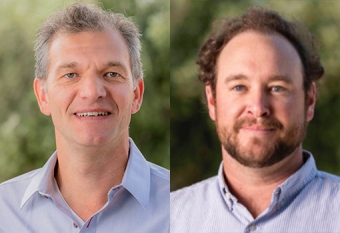
Two UC Santa Barbara faculty members, Mahdi Abu-Omar and Phillip Christopher, have been nationally recognized for their significant contributions to chemistry by the American Chemical Society (ACS) National Awards Program. Christopher, a professor of chemical engineering, received the 2022 Ipatieff Prize, a triennial award that recognizes an individual, who is not over forty years of age, for outstanding chemical experimental work in the field of catalysis or high pressure. Abu-Omar, a professor of chemistry and chemical engineering, received the 2022 ACS Award for Affordable Green Chemistry. Sponsored by Dow Chemical, the award recognizes a chemist for outstanding scientific discoveries of new eco-friendly chemistries having the potential to enable products or manufacturing processes that are less expensive than existing alternatives.
“We are tremendously proud of Mahdi Abu-Omar and Phillip Christopher, and we offer them enthusiastic congratulations on this recognition of their outstanding achievements” said Tresa Pollock, interim dean of the College of Engineering. “Peer commendation from one of the world’s largest and most important scholarly societies serves to underscore the important and pioneering work being conducted at the college to solve society’s biggest problems.”
“On behalf of the Chemical Engineering Department, we congratulate Professor Abu-Omar and Professor Christopher on this well-deserved recognition,” said Rachel Segalman, chair of the Chemical Engineering Department. “To have two professors receive prestigious ACS national awards is not only a reflection of their innovation and insightful contributions to the fields of chemistry, chemical engineering, and catalysis, but also a testament to the significant impact the university is making on sustainability.”
Christopher’s research focuses on developing new ways to understand and design catalytic processes, the chemical reactions driven and expedited by a material known as a catalyst. Converting oil to gasoline, and turning natural gas and nitrogen into fertilizer are just two important processes that rely on catalysis.
“Receiving the Ipatieff Prize is humbling and a recognition of the work done by my PhD students, postdocs, and collaborators,” said Christopher, the Mellichamp Chair of Sustainable Manufacturing. “Vladimir Ipatieff made a huge impact on the petrochemical industry and catalysis field – it is an honor to receive a prize in his name.”
Christopher’s lab builds and designs reactors and uses light, spectroscopy, and microscopy to probe the structure and function of catalysts in order to gain molecular-level insights that enable the design of more sustainable materials and more environmentally friendly catalytic processes. For example, their work could lead to processes that require fewer precious metals, especially platinum-group metals used in automobile catalytic converters.
Abu-Omar works at the interface of chemistry, chemical engineering, and catalysis to address unresolved issues in energy science, sustainability, and green chemistry. His research group focuses on solving the world’s growing plastics waste problem by taking a visionary look at reusing plastics in novel ways. The group works to create the science that will provide renewable and recyclable alternatives to materials made from petro-chemicals.
"I am honored and excited to receive this award,” said Abu-Omar, the Mellichamp Chair of Green Chemistry. “It is a recognition and testimony of the contributions of past and present graduate students and postdocs in my research group with whom I have had the privilege to work and collaborate We are all very excited about the prospects of using renewable feedstocks to make chemicals and materials, and we look forward to continuing our scientific and engineering contributions in green chemistry."
Abu-Omar and Christopher are both part of the university’s Sustainable Materials and Product Design (SMPD) Initiative, established by an endowment from Duncan and Suzanne Mellichamp. The initiative, which established four endowed research chairs, incorporated sustainability considerations into research in the chemical sciences and engineering with the goal of increasing efficiency, reducing the environmental impact, and improving social acceptance of alternative chemical technologies through collaboration. Christopher and Abu-Omar, who have collaborated on many projects, co-advised PhD students and published papers together, believe the national awards recognize the impactful research being performed at UCSB by the Mellichamp Sustainability Cluster.
“It is such an exciting time to be at UCSB and part of our Mellichamp Sustainability Cluster, where we are tackling cutting-edge problems in science and engineering with significant societal impact,” said Abu-Omar, a fellow of the American Association for Advancement of Science and founder of Spero Renewables LLC, a green specialty chemicals and technology company. “Professor Christopher and I are part of an invigorating and collaborative atmosphere here at UCSB that it’s pretty hard to describe in words; you have to live here to experience it. It is very special.”
“I see this as confirmation of the innovative research being performed in the cluster,” said Christopher. “It is an honor to collaborate and co-advise PhD students with Mahdi. I look forward to working on impactful research with him for many years to come.”
The ACS will honor its 2022 recipients at an awards ceremony during its national conference next March. Founded in 1876 and chartered by the U.S. Congress, the ACS has more than 155,000 members in 150 countries.



